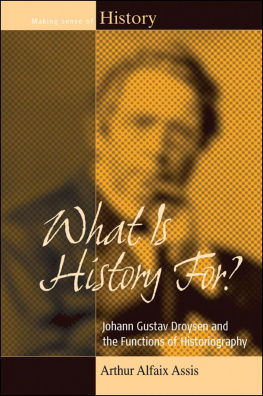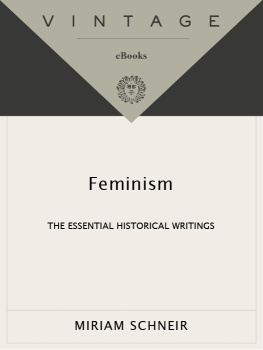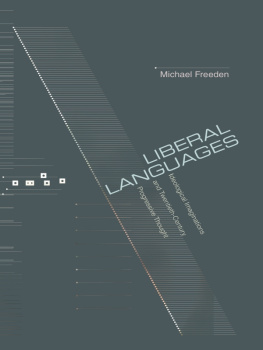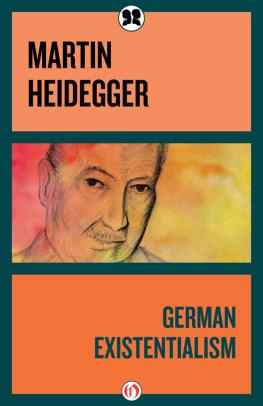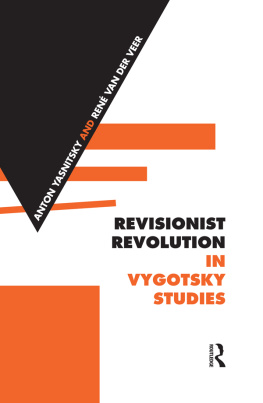ROUTLEDGE LIBRARY EDITIONS: HISTORIOGRAPHY
Volume 32
HISTORY AND LIBERTY
HISTORY AND LIBERTY
The Historical Writings of Benedetto Croce
A. ROBERT CAPONIGRI
First published in 1955 by Routledge & Kegan Paul Ltd
This edition first published in 2016
by Routledge
2 Park Square, Milton Park, Abingdon, Oxon OX14 4RN
and by Routledge
711 Third Avenue, New York, NY 10017
Routledge is an imprint of the Taylor & Francis Group, an informa business
1955 A. Robert Caponigri
All rights reserved. No part of this book may be reprinted or reproduced or utilised in any form or by any electronic, mechanical, or other means, now known or hereafter invented, including photocopying and recording, or in any information storage or retrieval system, without permission in writing from the publishers.
Trademark notice: Product or corporate names may be trademarks or registered trademarks, and are used only for identification and explanation without intent to infringe.
British Library Cataloguing in Publication Data
A catalogue record for this book is available from the British Library
ISBN: 978-1-138-99958-9 (Set)
ISBN: 978-1-315-63745-7 (Set) (ebk)
ISBN: 978-1-138-19485-4 (Volume 32) (hbk)
ISBN: 978-1-315-63866-9 (Volume 32) (ebk)
Publishers Note
The publisher has gone to great lengths to ensure the quality of this reprint but points out that some imperfections in the original copies may be apparent.
Disclaimer
The publisher has made every effort to trace copyright holders and would welcome correspondence from those they have been unable to trace.
HISTORY AND LIBERTY
The Historical Writings of Benedetto Croce
by
A. ROBERT CAPONIGRI
First Published 1955
by Routledge & Kegan Paul Ltd
Broadway House, 6874 Carter Lane
London E.C.4
Printed in Great Britain
by Butler & Tanner Ltd
Frome and London
TO
PROFESSOR HERBERT W. SCHNEIDER
with esteem and gratitude
PINDAR: Isthmian IV
CONTENTS
T HE thought and achievement of Benedetto Croce surely need no introduction in the English-speaking world. During the past half-century his fame and reputation have spread, quite literally, to the farthest reaches of the world. Translations of his writings and discussion of his ideas are to be found, not only in the principal, and even the lesser, languages of Europe, but in the tongues of the Middle and Far East, in Russian and in Japanese. Greater testimony to the universal resonance of his ideas could scarcely be asked. The English-speaking world, however, anticipated all otherseven Germany, from which he drew so much inspirationin appreciation of this universal relevance of his thought. His impress, moreover, was not only early, but deep. Certain of his ideas have entered into the permanent intellectual patrimony of English-speaking culture. That expressionism is now the point of departure of aesthetic theory, in England and America, as well as in Italy, is principally the effect of that impress. To speak of an introduction would, consequently, be both anachronistic and superfluous.
There would, however, seem to be ample occasion for, and fruit to be hoped from, a discussion of Croces historical writings. This persuasion has its roots in a variety of reasons, both immanent to these works and circumstantial to the mutual receptivity between continental and English-speaking culture. A fresh interest in, and appreciation of, the problems of history, both as the theory of historical process and as historiography, has become one of the marked characteristics of twentieth-century thought. In general, the source of this interest is humanistic and stems from a diffidence toward the human potential of a science unguided by human sympathy and ethical insight. This interest has been felt with special force in the English-speaking world, in which both humanism and scientism have profound attachments. It has received its most vigorous logical development, however, in Italy, precisely in the historiographic practice of Croce. As in the case of aesthetics, a profound community reveals itself between the preoccupations of the two cultural spheres, and many English scholars have been concerned to secure the common fruits thus promised. In the last analysis, however, the occasion and the justification for the discussion of Croces historical works reside in those works themselves. The inner quality of the vision of mans life in time which pervades them, and not any circumstantial criterion, must ultimately measure their stature and justify their claim upon the attention of reflective men. The purpose of the present essay has kept in view both of these factors. It seeks to minister, in a small way, to the cultural and intellectual understanding between the Italian and the English-speaking spheres; but it is concerned above all to present this inner and pervasive vision of Croces histories in its true lineaments, to be judged by its own quality.
What is the ultimate quality of this vision of history in Croce? It may be expressed in a single phrase: history is the history of liberty. The phrase itself is not new, any more than that vision itself. It is rather the immemorial vision of history which has evoked the profoundest movement of the spirit of western man. The particular achievement of Croce as an historian and as a theorist of history (and these roles are one, for his reflections upon history have their origin in his commitments as an historian) is the clarity and force with which he has apprehended and stated this immemorial vision in terms conclusively cogent in the twentieth century. His apprehension, moreover, possesses the dimensions of human reality itself. He sees the meaning of liberty, of human liberty in history, in its pure idea. Thus his affirmation of the spirituality and the essential creativity of the human agent is unfaltering. At the same time, however, he apprehends with almost microscopic clarity the existential labour of the spirit in the creative process of history, the almost Sisyphean labour by which that image of liberty is converted into the historical reality of human institutions. Finally, his historical writings are permeated with a profound appreciation of the ethos and the pathos of the labour of the human spirit in history. This vision, once glimpsed, needs no apology. It transcends all cultural limits and addresses itself directly to the profoundest interest of men in all times and in all circumstances.
N OT the least pleasure accompanying the completion of any work is the expression of ones gratitude to all who have contributed to its accomplishment. The authors gratitude goes out, before all, to the late Senator Croce; he not only opened the vast resources of his private library to the writer, but, despite advanced age and great illness, favoured him with personal counsel. His appreciation is very nearly as keen for the courtesy and aid extended by the staff of the Italian Institute for Historical Studies in Naples and especially by its director, Prof. Federico Chabod. Prof. Raffaelle Franchini, of the Nunziatella in Naples, Profs. Paul Bosco and Paul E. McLane of the University of Notre Dame, and Prof. Carlo Antoni of the University of Rome have offered him assistance too great to be measured. His wife, Winifred, by her encouragement and care has contributed daily to the work. His thanks must go also to his assistant, Mr. John Haddox, for his painstaking work on manuscript and proofs. Finally, he expresses his gratitude to the Committee on Publications of the University of Notre Dame.


